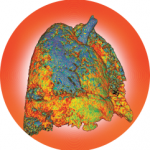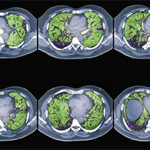NEW YORK (Reuters Health)—Transbronchial lung cryobiopsy (TBLC) and surgical lung biopsy (SLB) had a high level of agreement for diagnosing interstitial lung disease in the first comparative study. “These data suggest that TBLC, when done by an experienced proceduralist, is a valid first-line minimally invasive diagnostic tool for patients with interstitial lung disease deemed to…
Search results for: interstitial lung disease

Nintedanib Slows Lung Deterioration in General Fibrosing Interstitial Lung Disease
NEW YORK (Reuters Health)—Nintedanib dramatically slows lung deterioration in patients with progressive fibrosing interstitial lung diseases, according to a new randomized study.1 Nintedanib has already been shown to be effective against idiopathic pulmonary fibrosis (IPF). The new trial, funded by the manufacturer, Boehringer Ingelheim, and presented t the European Respiratory Society International Congress 2019 in…

Results for Nintedanib in Patients with Systemic Sclerosis-Associated Interstitial Lung Disease
A study of nintedanib in patients with ILD associated with systemic sclerosis showed the treatment had only limited improvement. Although these patients had a lower rate of decline in forced vital capacity than those on placebo, nintedanib did not result in clinical benefits for other manifestations of systemic sclerosis…

Recent Study Evaluates Nuclear Imaging in Interstitial Lung Disease
A recent proof-of-concept study to evaluate nuclear imaging in interstitial lung disease (ILD) concludes it is feasible to study ILD subtypes using this technology to visualize specific molecular processes of ILD. The process has important potential applications for the development of targeted molecular therapies.1 ILD is an umbrella term for a group of heterogeneous lung…

Interstitial Lung Disease: What Rheumatologists Need to Know
In the past decade, the treat-to-target concept has gained broad acceptance. Both the ACR and European League Against Rheumatism (EULAR) management recommendations include adding biologic therapies to the treatment regimen for rheumatoid arthritis (RA) patients who do not sufficiently respond to methotrexate monotherapy. “What EULAR says is that if [methotrexate use fails], you should essentially…

MUC5B Promoter Variant Associated with RA with Interstitial Lung Disease
New research has linked the risk of developing interstitial lung disease in rheumatoid arthritis patients with the promoter variant in MUC5B, which may also contribute to the development of idiopathic pulmonary fibrosis and an unsual interstitial pneumonia seen by high-resolution CT scan…

Cyclophosphamide for Connective Tissue Disease-Associated Interstitial Lung Disease
A recent systematic review found no clear evidence that rheumatoid arthritis patients treated with cyclophosphamide have better lung function than those treated with mycophenolate mofetil. The researchers caution that physicians should expect treatment with cyclophosphamide may only result in a modest improvement in the preservation of forced vital capacity…

CCL2 Cytokine Serves as Biomarker in Interstitial Lung Disease
A recent prospective, observational cohort study of potential clinical biomarkers for progression to interstitial lung disease (ILD) in patients with early systemic sclerosis (SSc) found that higher levels of CCL2 circulating in their plasma predicted both faster ILD progression and poorer survival rates than in those with lower levels.1 CCL2, also known as monocyte chemoattractant…

When Interstitial Lung Disease and Connective Tissue Disorder Intersect in Rheumatology Patients
SAN FRANCISCO—Interstitial lung disease (ILD) represents a heterogeneous group of disorders characterized by inflammation or fibrosis of the lungs. The disorders are also associated with a spectrum of connective tissue diseases (CTDs). ILD is a common manifestation of CTDs, such as scleroderma, poly-/dermatomyositis and rheumatoid arthritis—and is a leading cause of morbidity and mortality in…

Case Report: Interstitial Lung Disease with Positive ANCA Test
“Worst of all is the pain in my calves,” she said. “It feels like burning deep inside.” So began my first encounter with a 69-year-old woman who was referred to rheumatology clinic for evaluation of two months of constitutional symptoms and a positive ANCA test, which had been ordered by her primary care doctor. Her…
- « Previous Page
- 1
- 2
- 3
- 4
- …
- 27
- Next Page »